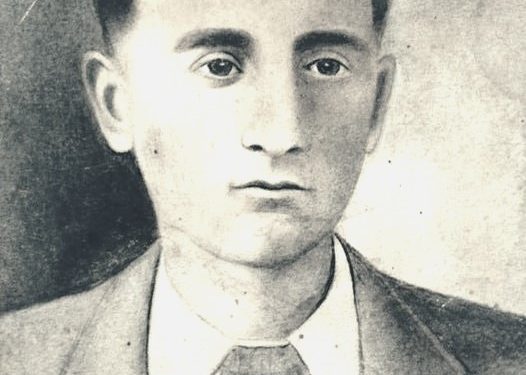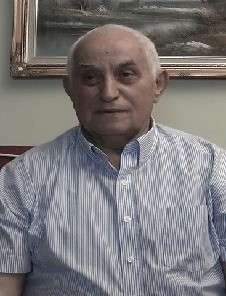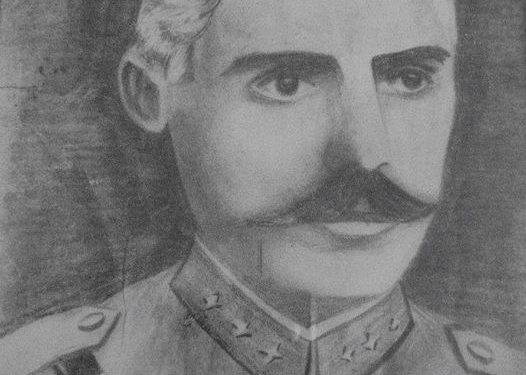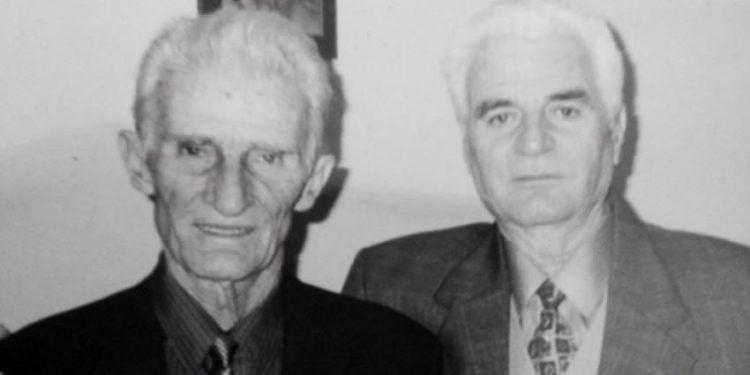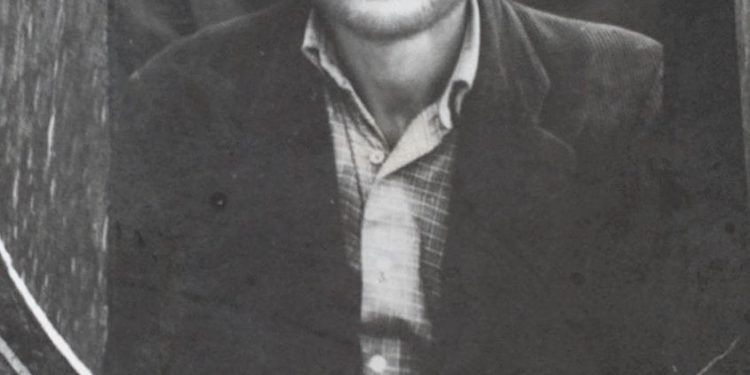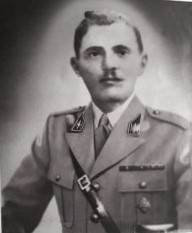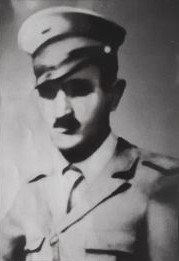By Dritan Kolgjini
Memorie.al / Ali Hakik Mena, originally from Fushë-Lura in the district of Dibra, son of one of the most famous nationalist families, not only in that province, but also in the entire North of Albania and beyond, an intellectual of prominent since the period of the Bird Monarchy, who after fighting with guns in hand against the communist regime, with many other members of his family, was arrested in 1947 and after being sentenced first to death, then to 101 and as conclusion, with 25 years in prison. In 1960, Ali Mena died in the prison hospital, under unknown circumstances even today, where his body has not yet been found. For more about this and his entire history in the prisons of Enver Hoxha’s communist regime, see the interview with Mr. Viktor Martini, originally from Shkodra and residing for years in the USA, one of his co-sufferers, who knew Ali Mena, in the camps and prisons, where he himself was sentenced at the age of 16.
Mr. Martini, you were a political prisoner, in several camps and prisons, during the time of communism, where you were acquainted with many historical personalities or members of prominent families of Albania, as you have shown in some of the interviews you have given. Exactly, for one of your fellow sufferers, Ali Hakik Mena, we ask you to say something that you remember, from the period when you were in the same prison, in Tirana?
First of all, I feel it necessary to explain how I was imprisoned or how they made me to be politically imprisoned. I had just turned 16…! And what can a 16-year-old be called, they mature politically! Through a false accusation, I was arrested for attempted escape, and sentenced to 7 years in prison. But this misfortune created the opportunity for me to join that proud part of the nation, from whom I received my first intellectual and moral lessons. One of these teachers is the incomparable nobleman, the unyielding intellectual Ali Mena.
More than 70 years have passed, but I thank God for keeping my memory fresh. Not only in order not to forget these heroes, but also to let them know, the most important part, the Albanian youth, who have not had the chance to listen to the stories of the anti-communists. And of course, also to slap the politicians of these 30 years in the face today, who, not without purpose, seek to cover them with the dust of oblivion. But no! No matter where the wind blows, the pages of history cannot be digested or erased.
Historians of Enver Hoxha’s period have presented a story according to the dictator’s tastes, in the most hypocritical way. And so they continue today. But I have great conviction and hope in God, that another generation is coming, who are not insensitive or uninterested in the true story. Therefore, I believe that they do not want the history of these heroes to remain and be buried there, with those people who worked selflessly, for the nation, religion and country, and, above all, they sacrificed themselves to the red storm, which the dignity of the Albanians, to stand without falling down and being trampled underfoot, just as it happened during the 46 years of that infamous regime, I believed it to some extent even today.
Please, can you give us a general description of the human, political and intellectual profile of Ali Mena?
Ah!… Ali Mena?! How difficult it is to complete the figure of a man, with all the virtues inherited from his tribe and which God had generously forgiven. Virtues which, through the sufferings and tortures he had gone through with his tribe, he managed to keep intact and pristine, in the face of the tyrants, who sowed nothing but violence, blood and hunger.
After I was sentenced, I went to Shkodra prison; from there I was sent to Rinas camp. And, because I had a broken leg, I was transferred to Tirana prison as unfit for work. At this time, I was the fourth brother, in prison, and our father had died, in Burrel prison. It seemed to me that I was in the middle of the crowd, like a wren scared and saddened by the terrible storm.
I remember the time when, after taking a seat in the long row of mattresses, the prisoners began to come one after the other, pushed more by curiosity, who I am, where I come from, etc. The next day, a tall and thin man asked me: “Can I sit down?” “Why not”! – I told!
– “Where are you from? My name is Ali Mena”, – introduced himself first.
And my name is Viktor Martini, – I answered. – “I’m from Shkodër, I come from Rinas camp”.
– “Don’t you have anything to do with Pac Martin”? – He asked me.
– “That’s my brother”!
– “How old are you”? -“16 years old”! – I answered.
His eyes filled with tears, but restrained tears. You say that the pupils of his eyes were like two loud noises. As the days passed, I learned that Ali taught the prisoners in English, which he mastered almost as well as the English themselves. Inside the room, from the debates that were opened on intellectual topics, from the most different ones, Ali with a distinct coolness dominated the way he presented and defended the argument. So he was versatile as an intellectual.
One day Ali told me; “if you want, you can come and take English lessons with me”? Of course, – I told him, – I would be grateful. So, then, I started taking the initial lessons. After the lesson, I slowly began to ask him where he was from, and why he had gone to prison. When I asked him for the first time, he put his lips to the gas and, wanting to clarify, he said briefly: – “It’s a long story! It’s better not to listen to him”! This made me curious and as with stunts, I did not give up my desire, since he seemed to me a special person, from his behavior, level of knowledge, culture, etc.
You are told that Ali has taught you English in prison conditions…! What do you remember from that time when, with handcuffs in your hands, you sought to open another window of knowledge, ignoring the infernal conditions where you found yourself?
It is true that, although we were inside hell, we tried to get the light of knowledge from the educated, because knowledge eases suffering! I have said several times that in prison people, among the problems they had, tried to benefit from the culture that we lacked. And these intellectuals performed these sacrifices with devotion, which later cost us a lot. Among these men you stand out and we feel for you Ali. Therefore, it was no wonder what he had gone through, never mind doing such a humane job.
The last physical memory I have of the feeling is when I was transferred from Tirana to Shkodra prison. Ali came, greeted me and said: “Have a good trip! You are a very brave and intelligent young man. One day we expect a lot from you”! That was the last time I saw him.
What do you know or what information do you have from the history of the multiple punishment (initially the death penalty, which was then returned to 101 years, and finally 25 years), of your co-sufferer Ali Mena, as well as from his history of armed resistance to the communist regime?
As I told you above, I was curious to learn something from his life. And he came out slowly, on different occasions, he told me that by family, they were birders, and that, as loyal to him until death, they had taken the mountains, to fight communism with weapons in hand. He told me the life of resistance in the mountains, in very difficult conditions, in caves, in snow and rain, with the dry bread that relatives and old friends gave them, at the risk of their lives. He told us about the sieges, the scenes of the sieges, and several times during these sieges, he told us how he had lost his closest people, comrades, friends and benefactors. I don’t remember exactly, but if I’m not mistaken, 5 or 6 people, only from his family, fell in the war with weapons in hand, but for the homeland and freedom. For these heroes, respect must be at its maximum!
There are indications that Ali’s death is a state crime, or otherwise an extrajudicial execution. Can you tell us something more about this moment?
It is known that after the stomach surgery, he was in good physical condition. In addition, Ali’s family met the day before he died, or was killed, and they testify that he was safe and sound…!
Meanwhile, after 5 days of the surgical intervention, his body started showing signs of poisoning. More precisely, it is suspected that his murder was planned by the State Security, presenting it as a natural death…! What do you know about this case?
I can’t say that we feel for Ali, he was in perfect health after all the suffering and torture he told us. But I am sure that people with a strong character, like Ali, can withstand illnesses. I escaped early from Tirana prison and ended up in Burrel prison at the age of 18. I don’t know if they killed him or if he died naturally!
But I have several other cases, like that of Tuk Jakova, who was in Tirana prison, where he got appendicitis and was taken for surgery where he died. There were many such cases in the prisons and camps of communist Albania. This may be one of the cases, and very acceptable as a possibility. But the truth still remains a mystery, for how long, we don’t have a witness or a document. Unfortunately,
Neither the witnesses want to talk to us, nor do we have the documents, because they have deliberately disappeared.
Regarding the death of Ali, we have heard from various contemporaries that the prisoners visited each other in some prisons in Albania, or as they say otherwise, “they hatched a mort” inside the prison. Another fact that impresses you is the number of about 2,000 telegrams of condolence addressed to the family by his companions, friends and well-wishers. Do you remember anything about the echo, or the effect on the prisoners, of the news about the death or murder of Ali Mena?
Generally, when someone died in prison, the body was immediately taken away and buried in places known only to the offender, so that it would never be found. In the absence of a close person, inside the prison, in these cases, we silently respected the dead, without moving from the mattress, which represented our “home”. But his death and the others have always had an echo; they have been treated with sincere human respect, you feel deeply, as a loss of the people of the country, the death of these men.
Do you have any information about Ali’s burial place or have you heard about the efforts and vicissitudes of his brother, Isa Mena, who made all possible attempts to find him, even going to the Ministry of the Interior, the Prosecutor’s Office In general, but still, absurdly, he was not allowed to see the corpse or the grave, which leaves room for doubt, as we said, that the crime committed could be discovered…?!
They told me the truth, I don’t have much to say, because I said it above, inside the prisons, we didn’t know what happened to the corpse, which ended up in the cemetery, without the mother. And this was a practice that was applied with fanaticism, by the servants of the regime, which practically condemned even the corpses of the dead, in addition to the living.
What name can you give to the fact that even after Ali’s death or execution, his family was strictly forbidden by the Ministry of the Interior to participate in the funeral?!
Apart from the desire, to participate in the funeral, everyone has knocked on the wrong door, because not even one of them was imprisoned, he did not enjoy that “privilege”.
In addition to executions, imprisonment, looting of property, etc., one of the forms widely practiced by the communist regime was exile. So, in relation to the punitive deportations of families, where elders, women and children were exiled, and in this context, for the Menaj family, what can you say, what do you remember or do you know?
The dictatorship, not even for a second, is satisfied with the suffering and blood of this layer. We all know that the tribes of Menaj, Mirakaj, the Gjonmarkaj family and many, many other noble families have experienced the denial of freedom, through exile, where a large part of them married, were born and died there. But even those that survive to this day, are not getting what they deserve, because their fate and rights are in the hands of those who hate this class and, in the most inhumane way, try to use it politically. This seems to me very unworthy, from the pseudo-democratic politics of the last two decades.
In previous interviews, you have confessed that practically all the men in your household, even the women, have been incarcerated. Aliu had more or less the same family history, where the men were in prisons, while the old women and children were in exile. Do you agree with the opinion that this was a genuine genocidal strategy, i.e., the disappearance of men from known anti-communist homes?
Viktor Martini: Even the smallest violation, when it violates freedom, we can call it genocide, no, let’s not call it genocide, the efforts of dictators, to bury us as a class, until physical extinction, totally.
The history of the anti-communist resistance, after ’44, is for the most part hidden and unknown to the general public. In this context, what can you tell us about the well-known resistance of the men of the Bajraktar tribe of Lura, Menaj, of whom 9 people were killed with weapons in their hands against communism?
No, no… It is not unknown… the history of the Menaj family, just like that of other families of this category, circulates like those legends that are never forgotten. But the bad thing is that some historians try to hide the events, they tried to cover them with their shameless lies. But shame has covered them, because the truth will one day shine, because, as the popular expression says; “the sun does not burn with a sieve”!
In your judgment, these sublime sacrifices, with lives on the national altar, we consider the disappearance of Ali Mena, his brother, Isa Mena, who would be killed two years later at the border, and his 7 brothers and cousins, who were killed during the anti-communist resistance, until 1948, – how much was it worth at that time, or later, to make people aware of the evil called communism?! Secondly, in relation to these martyrs of freedom, are we conscious as an Albanian society, in relation to their sacrifices, which went as far as self-sacrifice?
The sacrifices of the tribe of Menaj, there is no force to redeem them, they are thrown into oblivion. But with the Albanian community, things change a bit. A large part of it became “our new man”. To make a friend aware, who acted without national responsibility, is the most difficult thing so far. This task belongs to us, let’s take it on. With patience, they convince you that we will get there. It is neither easy nor fast, but not impossible.
If we don’t sit idly by, we will be able to put these heroes on the highest pedestals, where they deserve to be. And only then, we can feel proud. And that’s the only way these heroes will rest in peace, freed from dictatorial monsters. These delays are in no way due to us, but to the shame of Albanian politics, from these three decades, and let’s not forget that this injustice to the truth and history, the dictator’s scribes, holds it in honor and pride…!
Although you were young, you described Ali as a “zogist”, and this is a well-known fact, since the house of Bajraktar of Lura has historically been connected to Zogolli. Can you tell us how the “birders” were organized in prison conditions?
The men of the Mena tribe are known as birders, loyal to the King, steadfast as nationalists. Ali in prison kept all the birders around, keeping alive the hope that one day freedom and the fall of tyranny would come. Moreover, no one could do it.
There is a general idea, that communism has concentrated all its ferocity without rest, on those families or persons, who were known as nationalists, and in this layer, the “zogists” held the main weight. Connecting it to the genocide against Menaj, an old historical and nationalist family, – how true do you think this statement is? That is, did the regime really make “differentiations” even in persecution, or did it “select” its victims?!
Of course, the Albanian nationalists carried the heaviest burden in the dictatorship, because they were the danger of the dictator Enver Hoxha and also his successor, Ramz Alia. Albanian nationalism was made up of the ‘Zogists’, the ‘Independent National Bloc’ and the ‘Balli Kombëtar’. All three of these groups had different platforms, but what they had in common was the idea of a great, ethnic Albania.
Without exception, the whip of the dictatorship fell on all the members of these parties, but in the most inhumane way, it fell on the leaders, the organizers, who came from families, by birth and death. For example, the tribe of Gjonmarkj, or the Mirakaj and thus also the tribe of Menaj, without mentioning here those of the south, who suffered the blackest days, by no means smaller, than those of those I mentioned above.
For 46 years of communism, state violence has been used in Albania, against that layer that was labeled as “politically affected”. These people were the moral cards at the beginning of the changes in 1990. How much could a person resist the political pressure of the regime, and how conscious is the Albanian society today of these sacrifices?
Even, as an additional “enemies of the Albanian people…”! But it is precisely these layers, that in January 1990, released the dedication that; the dictatorship must end. I was one of those who stood up strongly, on January 13, 1990, in Shkodër. And on this same date, I was arrested, tortured and isolated in the Psychiatric Hospital of Elbasan, where they kept me in a coma for two consecutive months.
Are you aware that practically nothing has been written about Ali Mena until today, and perhaps this interview of yours can arouse the attention of the relevant state authorities in Albania, to commemorate with an appreciative gesture, giving him his name, a road, or a school, etc., as a sign of awareness, towards that contribution and sublime sacrifices, for freedom and human dignity, of one’s country?
Your claim is very reasonable for Ali Mena and for this whole category that deserves to be immortalized. But on the other hand, I am amazed at the reasoning of you and many others actually…! You are asking these heroes to be respected, precisely by the descendants of the communists…?! You think they have a problem with our devaluation?! Don’t you see that these 30 or so years, they have played the most inhumane game, with decorations, you are mocking us badly?!
Do you think we should be proud, why was King Zog’s memorial placed in Tirana!?
Ali would feel very insulted, as if he were honored by the former chameleons and heirs of today’s politics. The time will come for Ali and his friends, that one day they will be appreciated as they deserve, by the heirs and the new anti-communist generation. So be patient and don’t rush. On this occasion, I thank you as the media, for the opportunity you gave me, to witness and respect those heroes, worthy of calling them glorious sons of the Albanian nation.
I feel very satisfied, that I am carrying out a trust left to me by Visarjon Xhuvani, the Archbishop of the Albanian Orthodox Church, when in the courtyard of the Burrel prison, he said to me: “In the name of God, I charge you to be a witness to our sufferings, when one day we don’t have to be”! I was 18 years old then, and I will continue to be a witness of the suffering of honest people who sacrificed for the freedom and dignity of the Albanian people.
Thank you Mr. Martin.
Who was Ali Hakik Mena?
He was born in Fushë-Lure in 1923, in the large family of Bajraktar in the province of Lure;
Completes basic school or boarding school in Tirana;
Follows Shkodra High School until the end of the fourth year;
Expelled from school before matriculation exams, for anti-Italian activity;
He was the organizer of several demonstrations and protests at school, against the Italians.
Passed the matura exams, in “Normalen” of Elbasan.
He returns to his hometown at the age of 20 and joins his family;
Fights with weapons in hand against the communist government, together with the brothers and sons of the elder, Selman, until 1947-’48.
Arrested and imprisoned on August 8, 1947;
Ri is sentenced in prison, on 10.5.1957, being sentenced to life imprisonment, which is then returned to 25 years in prison;
He died in the prison hospital, under very suspicious and still unexplained conditions and circumstances even today, on 24.05.1960;
He knew and mastered foreign languages very well, such as; English, French, Italian and to some extent Russian, which he learned in prison;
He knew Fishta’s “Lute of the Highlands” completely by heart;
He was married to the daughter of Selim Kaloshi, from Sina e Dibra, who was shot with his brother Elez.
Ali’s wife, Hazbija, was interned in Berat, where her only daughter, Feridja, died at a minor age, while she herself died in 1957, at a young age. Memorie.al




